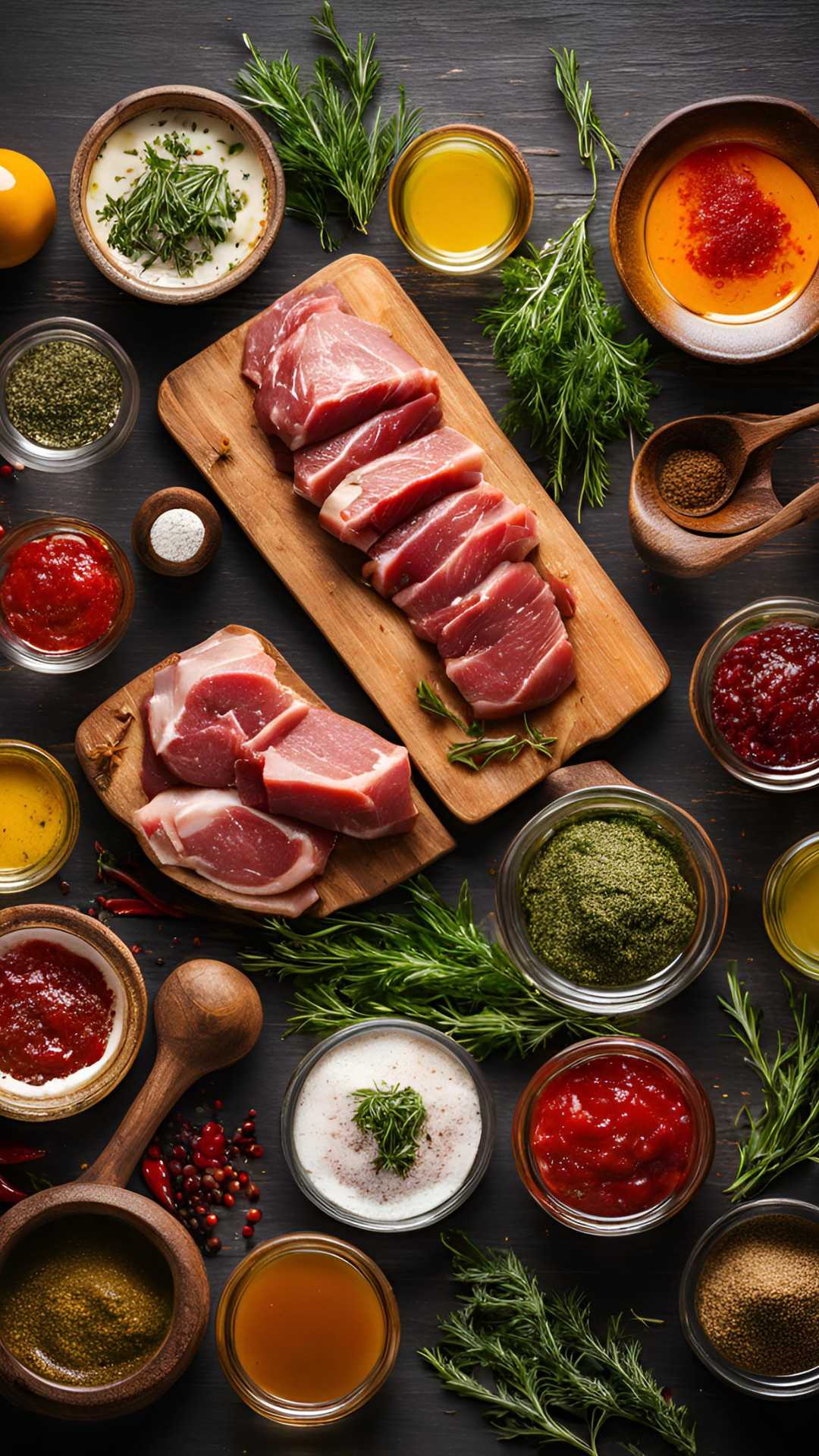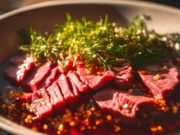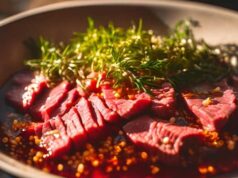Unlock the secrets of exceptional BBQ with this comprehensive guide on marinades.
Discover how these flavorful blends can enhance your grilling experience by infusing rich flavors and tenderizing meats to perfection. This guide outlines essential ingredients and assists you in selecting the appropriate marinade for various types of protein.
It also identifies common pitfalls to avoid and provides grilling tips to inspire you to explore new flavor profiles. Prepare to elevate your BBQ experience to new heights.
Key Takeaways:
- Marinades enhance flavor and tenderize meat by infusing it with a combination of ingredients such as acids, enzymes, and oils.
- Different proteins require specific types of marinades, so choose wisely to achieve the best results.
- Proper marinating techniques and avoiding common mistakes can elevate your BBQ experience and impress your guests with flavorful and tender meat.
What is a Marinade and Its Purpose?
A marinade is a flavorful liquid mixture used to soak meat and vegetables before cooking, primarily aimed at enhancing flavor and tenderizing the food. The marinating process involves immersing your choice of protein or vegetables in this mixture, which typically includes acidic ingredients like vinegar or citrus juice, along with oils, herbs, and spices. This allows the flavors to penetrate deeply into the food.
This technique not only improves the taste but also enhances the texture of meats such as chicken, beef, and pork, making them juicier and more appealing during cooking. Common ingredients like soy sauce contribute umami depth, while garlic and onion introduce aromatic complexities. The oil coats and binds these flavors, ensuring even distribution, while herbs like rosemary or thyme provide distinct notes that can complement various dishes.
It is essential to consider food safety; marinating should always be done in the refrigerator and for appropriate durations. This practice helps prevent bacterial growth while maximizing flavor absorption.
Essential Ingredients for Marinades
The essential ingredients for marinades are varied and serve specific functions in enhancing both flavor and tenderness. Key components typically include a base of oil, which helps lock in moisture, along with acidic elements such as vinegar or citrus juice that tenderize the meat and infuse it with rich flavor.
Additionally, herbs and spices are critical for adding depth, while ingredients like soy sauce and brown sugar contribute to a complex taste profile that can elevate any dish.
Types of Marinades
There are several types of marinades, each providing unique benefits for flavor enhancement and meat tenderization.
Acidic marinades primarily utilize vinegar or citrus juice to break down proteins in tougher cuts of meat, making them particularly suitable for grilling.
Enzymatic marinades incorporate ingredients such as pineapple or papaya, which contain natural enzymes to tenderize food.
Additionally, oil-based marinades help to lock in moisture and add richness, ensuring a delicious outcome whether you are preparing chicken, beef, or vegetables.

Acidic Marinades
Acidic marinades are recognized for their effectiveness in tenderizing meat and enhancing flavor through the use of vinegar or citrus juice. These ingredients work by breaking down tough protein structures, making them particularly suitable for cuts such as flank steak and skirt steak. The acidity not only adds a zesty taste but also facilitates the absorption of flavors from herbs and spices, thereby elevating the overall grilling experience.
For example, balsamic vinegar imparts a rich, sweet depth to chicken, while lime juice can brighten up fish fillets with its sharp, tangy profile. When marinating pork, apple cider vinegar introduces a slightly sweet note that beautifully complements the meat’s natural flavors.
The versatility of acidic marinades allows for a nuanced approach to cooking, transforming ordinary dishes into culinary delights. As these marinades penetrate the meat, they enhance both flavor and texture, resulting in a juicy and tender product that can satisfy any palate. This makes them an invaluable tool for both novice and experienced cooks.
Enzymatic Marinades
Enzymatic marinades harness the natural enzymes present in fruits such as pineapple and papaya to effectively break down proteins, resulting in tender, flavorful meat. This type of marinade is particularly beneficial for tougher cuts, as the enzymes work swiftly to soften fibers, making them ideal for grilling and barbecuing. By incorporating these fruits, you not only enhance tenderness but also add a tropical flair to the flavor profile, which is perfect for summer barbecues.
Other fruits like kiwi and mango can also serve as excellent options, each bringing unique enzymes that positively affect a variety of meats. The actinidin in kiwi and the bromelain in pineapple, for instance, can elevate a simple dish into a culinary delight.
When preparing to use these marinades, it is advisable to marinate for at least 30 minutes to a few hours, depending on the cut of meat, to ensure maximum flavor infusion and tenderness. By balancing the sweetness of these fruits with salt, herbs, and spices, you can create a harmonious blend that not only maximizes taste but also elevates any meal, enticing friends and family with a delightful dining experience.
Oil-Based Marinades
Oil-based marinades are essential for adding richness and moisture to meats while effectively carrying flavors from herbs and spices into the food. By utilizing a high-quality oil, such as olive oil, these marinades create a barrier that locks in juices during cooking, ensuring that your beef, chicken, or seafood remains tender and flavorful when grilled or roasted.
The type of oil you select can significantly influence the overall taste profile of your dish. For instance, avocado oil serves as an excellent alternative, providing a mild flavor while boasting a high smoke point, making it ideal for high-temperature cooking.
When you combine oils with herbs like rosemary or thyme and spices such as paprika or garlic powder, the marinades not only enhance the natural flavors of the meats but also promote a well-rounded seasoning. A simple blend of sesame oil with ginger and soy sauce can yield a delightful Asian-inspired marinade for chicken, while a hearty combination of canola oil, cumin, and cilantro pairs beautifully with beef.
Each oil contributes its unique traits, offering you an array of culinary possibilities.
Choosing the Right Marinade for Different Proteins
Choosing the right marinade for various proteins is essential for maximizing flavor and tenderness, as each type of meat requires specific care. For beef cuts like skirt steak and flank steak, a marinade rich in acidity—such as one made with vinegar and spices—enhances both tenderness and taste.
Chicken benefits from oil-based marinades that infuse moisture, while seafood often requires lighter marinades featuring citrus juice or soy sauce to preserve its delicate flavor.
When selecting a marinade, it is important to consider not only the type of protein but also the cooking method. For pork, a blend featuring sweet elements like honey or brown sugar can caramelize beautifully during grilling, adding depth to the flavor. Conversely, for robust cuts of beef, incorporating elements such as red wine and garlic can enhance its bold taste.
Each protein possesses distinct characteristics that can be accentuated with the appropriate ingredients, ensuring a delightful dining experience that appeals to a variety of palates.
How to Properly Marinate Meat
Properly marinating meat is essential for achieving optimal flavor and tenderness. This process involves utilizing the right techniques, timing, and safety measures to ensure delicious results.
Begin by selecting an appropriate container, such as a zip-top bag or a glass container, to securely hold your marinade and meat. It is critical to marinate in the refrigerator to prevent bacteria growth.
The ideal marinating time varies based on the type of protein, with tougher cuts benefiting from longer marination periods.
Common Mistakes to Avoid When Marinating
When marinating meats, it is essential to avoid several common mistakes that can lead to unappetizing results, affecting both flavor and tenderness. Using insufficient marinade can restrict the meat’s ability to absorb flavors, while marinating for too long may result in undesirable mushy textures. Additionally, neglecting food safety precautions, such as marinating at room temperature instead of in the refrigerator, increases the risk of bacteria growth and spoilage.
To achieve the best results, it is crucial to understand the proper balance of marinade to meat ratio, ensuring there is enough liquid to coat all sides evenly. Many underestimate the importance of timing; adhering to the recommended marinating periods for different types of proteins guarantees optimal flavor infusion without compromising texture.
Always prioritize safety—using a sealed container in the refrigerator not only preserves the quality of the marinade but also protects the food from harmful bacteria. By following these guidelines diligently, you can enhance your marinating technique and enjoy deliciously flavorful dishes.
Tips for Grilling After Marinating
Grilling marinated meats requires specific techniques to ensure optimal flavor and tenderness while adhering to safety guidelines. Start by allowing your marinated meat to sit at room temperature for approximately 30 minutes before grilling; this helps achieve a more even cooking temperature. Preheating your grill to the appropriate temperature is essential for properly searing the meat, which locks in the flavors and moisture developed during the marination process.
A preheated grill, ideally set between 400°F to 450°F, is crucial for achieving a good sear. Depending on the type of protein you are grilling—whether it’s chicken, steak, or pork—the cooking times can vary significantly. For instance, chicken may take about 6-8 minutes per side, while steaks can range from 4-6 minutes per side, depending on their thickness.
To maintain juiciness, you may consider using a two-zone method for indirect cooking after the initial searing. Always utilize a meat thermometer to ensure food safety, with chicken needing to reach 165°F and beef resting at around 145°F.
It is important to let the meat rest for a few minutes before serving. This resting period allows the juices to redistribute, enhancing the overall taste of the dish.
Frequently Asked Questions
What are BBQ marinades and why are they important?
BBQ marinades are flavorful liquid mixtures used to soak and coat meat before cooking. They are important because they infuse flavor and tenderize the meat, making it more juicy and delicious.
What are the key ingredients in a BBQ marinade?
The key ingredients in a BBQ marinade include an acidic component (such as vinegar or citrus juice), oil, spices and herbs, and a sweetener (such as honey or brown sugar). You can also add in other flavorings like soy sauce, Worcestershire sauce, or hot sauce.
How long should I marinate my meat?
The length of time you should marinate your meat depends on the type and thickness of the meat. As a general rule, you should marinate poultry for 2-4 hours, seafood for 1-2 hours, and beef, pork, or lamb for 4-6 hours. Avoid marinating for too long, as the acidic components in the marinade can break down the meat too much and change its texture.
Can I use BBQ marinades for all types of meat?
Yes, you can use BBQ marinades for all types of meat including chicken, beef, pork, lamb, and seafood. However, some meats may require shorter marinating times, so be sure to check the recommended times for each type of meat.
Can I reuse marinades?
No, it is not safe to reuse marinades. Once the marinade has been in contact with raw meat, it can contain harmful bacteria and should be discarded. If you want to use the marinade as a sauce, you should boil it first to kill any bacteria.
Are there any alternatives to using BBQ marinades?
Yes, there are other ways to infuse flavor and tenderize meat besides using BBQ marinades. You can use dry rubs, brines, or injectable marinades. These methods also add flavor and moisture to the meat and can be a great alternative to traditional BBQ marinades.



















































